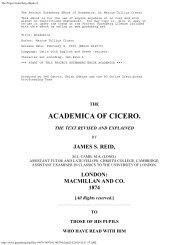From Farm House to the White House - 912 Freedom Library
From Farm House to the White House - 912 Freedom Library
From Farm House to the White House - 912 Freedom Library
You also want an ePaper? Increase the reach of your titles
YUMPU automatically turns print PDFs into web optimized ePapers that Google loves.
<strong>Farm</strong> <strong>House</strong> <strong>to</strong> <strong>the</strong> <strong>White</strong> <strong>House</strong>, by William M. Thayer 123<br />
that, unlike many of <strong>the</strong> large planters, he labored with his men on <strong>the</strong> plantation.<br />
"Fitted a two-eyed plough instead of a duck-bill plough, and with much difficulty made my chariot<br />
wheel-horses plough. Put <strong>the</strong> pole-end horses in<strong>to</strong> <strong>the</strong> plough in <strong>the</strong> morning, and put in <strong>the</strong> postilion and hind<br />
horses in <strong>the</strong> afternoon; but <strong>the</strong> ground being well swarded over, and very heavy ploughing, I repented putting<br />
<strong>the</strong>m in at all, for fear it should give <strong>the</strong>m a habit of s<strong>to</strong>pping in <strong>the</strong> chariot."<br />
"Spent <strong>the</strong> greater part of <strong>the</strong> day in making a new plough of my own invention."<br />
"Bottled thirty-five dozen of cider."<br />
"Seven o'clock a messenger came <strong>to</strong> inform me that my mill was in great danger of being destroyed by <strong>the</strong><br />
flood. I immediately hurried off all hands, with shovels, etc., <strong>to</strong> its assistance, and got <strong>the</strong>re myself just time<br />
enough <strong>to</strong> give it a reprieve for this time, by wheeling gravel in<strong>to</strong> <strong>the</strong> place <strong>the</strong> water had washed."<br />
"Surveyed some lines of my Mount Vernon tract of land."<br />
"Employed in running some lines between me and Mr. William Triplet."<br />
"Surveyed <strong>the</strong> water-courses of my Mount Vernon tract of land, taking advantage of <strong>the</strong> ice."<br />
"Laid out a road from Mount Vernon <strong>to</strong> <strong>the</strong> lane of Mr. Marley's."<br />
Irving says of Washing<strong>to</strong>n: "He was an early riser, often before day-break in <strong>the</strong> winter, when <strong>the</strong> nights were<br />
long. On such occasions he lit his own fire and wrote or read by candle-light. He breakfasted at seven in<br />
summer and eight in winter. Two small cups of tea and three or four cakes of Indian meal (called hoe-cakes)<br />
formed his frugal repast. Immediately after breakfast he mounted his horse, and visited those parts of <strong>the</strong><br />
estate where any work was going on, seeing <strong>to</strong> everything with his own eyes, and often aiding with his own<br />
hands."<br />
Soon after he introduced his wife <strong>to</strong> his Mount Vernon estate, he began <strong>to</strong> improve and adorn <strong>the</strong> grounds. He<br />
made lawns, laid out walks and avenues, set out a great number of ornamental trees, and planted orchards of<br />
fruit-trees. He posted himself as far as possible in <strong>the</strong> science of agriculture, and made many improvements<br />
upon his plantations, by reclaiming land and increasing <strong>the</strong> productive power of <strong>the</strong> soil.<br />
Once he conceived <strong>the</strong> idea of reclaiming <strong>the</strong> Great Dismal Swamp, and actually explored it with reference <strong>to</strong><br />
that ultimate purpose. Through his agency, <strong>the</strong> incorporated company known as <strong>the</strong> Dismal Swamp Company<br />
was organized. "This vast morass was about thirty miles long and ten miles wide, and its interior but little<br />
known" until Washing<strong>to</strong>n explored it, and found a lake six miles long and three miles wide near its centre.<br />
The large number of guests at Mount Vernon, and Washing<strong>to</strong>n's enjoyment in hunting, fishing, and visiting,<br />
particularly in winter time, when <strong>the</strong> cares of his plantation were less numerous, appear from his journal. In<br />
<strong>the</strong> month of January, 1770, are <strong>the</strong> following entries:<br />
"2. Mr. Peake dined here.<br />
"4. Went hunting with John Custis and Lund Washing<strong>to</strong>n. Started a deer, and <strong>the</strong>n a fox, but got nei<strong>the</strong>r.<br />
"5. Went <strong>to</strong> Muddy Hole and Dogue Run. Took <strong>the</strong> dogs with me, but found nothing. Warner Washing<strong>to</strong>n and<br />
Mr. Thurs<strong>to</strong>n came in <strong>the</strong> evening.<br />
"6. The two Col. Fairfaxes dined here, and Mr. R. Alexander and <strong>the</strong> two gentlemen that came <strong>the</strong> day before.















